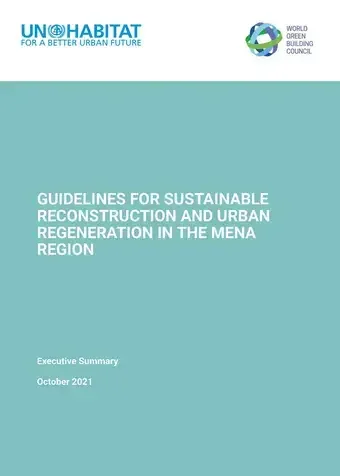
The United Nations Human Settlements Programme (UN-Habitat) and the World Green Building Council (WorldGBC) co-developed the Guidelines for Sustainable Reconstruction and Urban Regeneration in the MENA Region to highlight key issues, approaches and methods, and propose bespoke solutions for individual and community-wide sustainable reconstruction projects based on the Build Back Better, leveraging recognized sustainability practices in the built environment while also addressing context specific needs unique to post-conflict reconstruction and urban regeneration. This entails the restoration of physical infrastructure, environmental and societal ecosystems, and the revitalization of livelihoods through a thriving economy. In several MENA countries where conflict has destabilized the foundation of many communities, the methodical and planned recovery, rehabilitation and reconstruction that must take place is an essential antidote that can also increase the resilience of cities and neighborhoods. When communities are built back better, incorporating sustainability principles, societies are stabilized and economies revitalized.
The Guidelines for Sustainable Reconstruction & Urban Regeneration in the MENA Region is a working document that pools local and international knowledge and best practices in order to provide considerations and actionable guidance that addresses the changing environmental landscape for reconstruction in the MENA region. Among the primary aims of the document is to highlight the regulatory vacuum that exists in several postconflict cities and communities, and to fill that void with essential knowledge and tools that promote multi-stakeholder capacity and the prospect of inclusivity, long-term social stability, and economic recovery.